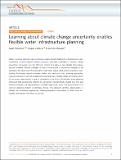Learning about climate change uncertainty enables flexible water infrastructure planning
Author(s)
Fletcher, Sarah Marie; Lickley, Megan Jeramaz; Strzepek, Kenneth
DownloadPublished version (1.309Mb)
Terms of use
Metadata
Show full item recordAbstract
Water resources planning requires decision-making about infrastructure development under uncertainty in future regional climate conditions. However, uncertainty in climate change projections will evolve over the 100-year lifetime of a dam as new climate observations become available. Flexible strategies in which infrastructure is proactively designed to be changed in the future have the potential to meet water supply needs without expensive over-building. Evaluating tradeoffs between flexible and traditional static planning approaches requires extension of current paradigms for planning under climate change uncertainty which do not assess opportunities to reduce uncertainty in the future. We develop a new planning framework that assesses the potential to learn about regional climate change over time and therefore evaluates the appropriateness of flexible approaches today. We demonstrate it on a reservoir planning problem in Mombasa, Kenya. This approach identifies opportunities to reliably use incremental approaches, enabling adaptation investments to reach more vulnerable communities with fewer resources.
Date issued
2019-04Department
Massachusetts Institute of Technology. Department of Civil and Environmental Engineering; Massachusetts Institute of Technology. Joint Program on the Science & Policy of Global Change; Massachusetts Institute of Technology. Department of Earth, Atmospheric, and Planetary SciencesJournal
Nature Communications
Publisher
Springer Science and Business Media LLC
Citation
Fletcher, Sarah et al. "Learning about climate change uncertainty enables flexible water infrastructure planning." Nature Communications 10, 1 (April 2019): 1782 © 2019 The Author(s)
Version: Final published version
ISSN
2041-1723